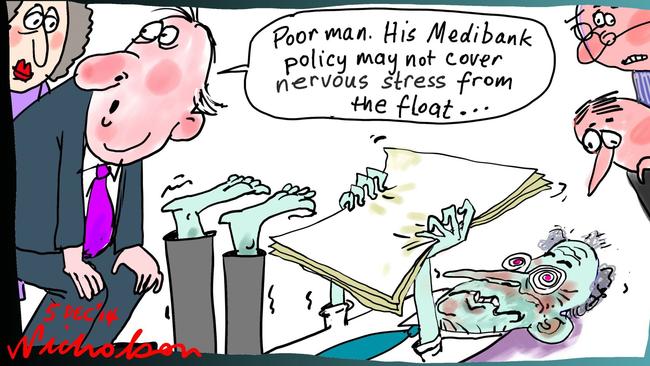Crunch time for Medibank investors

Stand by for some excitement on Monday in Medibank, which incidentally has been a model of cautious trading in recent days with a total price range of 4c all week, closing yesterday at $2.16.
That leaves the institutions a full 1c up on their investment while retail investors are ahead by 16c, although to be fair the price has climbed 1c every day since Monday. What makes this coming Monday a red letter day is that by then all retail investors should have had their well-scaled-back allocations formally settled and registered.
“It will be interesting to see how many people have sold stock that they don’t own,’’ said a broking voice yesterday, suggesting that there could be a few nervous short coverers active, picking up stock from retail holders making for the exit.
Meanwhile the government yesterday started refunding oversubscriptions, either by cheque (remember them?) or by electronic direct credit to their accounts. That’s been nice for our leaders to have on the books for what’s been around three weeks, but might have been more for early-bird subscribers.
We understand that the government has been holding $2.9 billion in oversubscriptions from the retail offer plus $300 million in the clawback from the Broker Firm allocation, which started at $1.5bn but was cut back by 20 per cent to $1.2bn, as the investors were warned might happen.
That does make the phrase “broker firm’’ look a little bit hollow, but we can’t say investors weren’t told. On our numbers there could be as much as $3.2bn going back to investors.
Advice for advisers
WHAT has been fascinating in recent weeks is the transition that the financial advisory industry is facing, in terms of the huge rush to get advice that is genuinely independent.
David Murray’s inquiry is bound to have something to say about the inherent flaws in the vertically integrated model of advice, despite the fact that it was while he was CEO of Commonwealth Bank that CBA got the ball rolling by buying Colonial First State.
He’s made it clear he won’t be doing the banks any favours, particularly in terms of capital requirements, and we’ve even heard he may look closely at the massive not-for-profit industry funds’ lack of any capital base of their own, since all the money they manage belongs to members. That’s speculation.
But there’s a case for saying the market may end up being able to take care of the distortions in the system, with the banks potentially pulling back from owning 80 per cent of the financial advisory businesses in Australia, and new entrants coming in to fill the gap.
It’s not just CBA and Macquarie, although their financial advisory brands have been badly damaged by the recent scandals: it’s the whole model, whereby a bank invents products then sells them to retail consumers, that is under the microscope.
There are some interesting new independent and well-financed entrants just ready to go, with transparent fee-for-service models that make all the recent (Future of Financial Advice arm wrestle look so last century.
“FoFA, in whatever form, is just a minimum standard,’’ said one, who added that acting in your client’s best interests, or giving the client the right to opt out every two years, is something that an ethical and competent independent adviser couldn’t possibly have any trouble with.
The whole truth
THE recent prizegiving put on by the Australian Investor Relations Association provided some fascinating insights into an industry that not many investors understand until you have episodes like the fight over Newcrest’s 2014 earnings downgrade. Much of what they do involves persuading broking analysts that their forecasts are wrong, without actually saying what they should be. One unnamed practitioner pounced on the foreword to an official history of the CIA, which left a few things out, as a leitmotiv for new entrants to the IR caper. “This may not be the whole truth, but it’s nothing but the truth,’’ he quoted, to applause.
Stepping out
SPOTTED in Melbourne yesterday looking dapper and fit was former BHP Billiton CEO Marius Kloppers. We’re not saying new man Andrew McKenzie’s falling to pieces but not running the world’s biggest miner is clearly agreeing with Kloppers.


